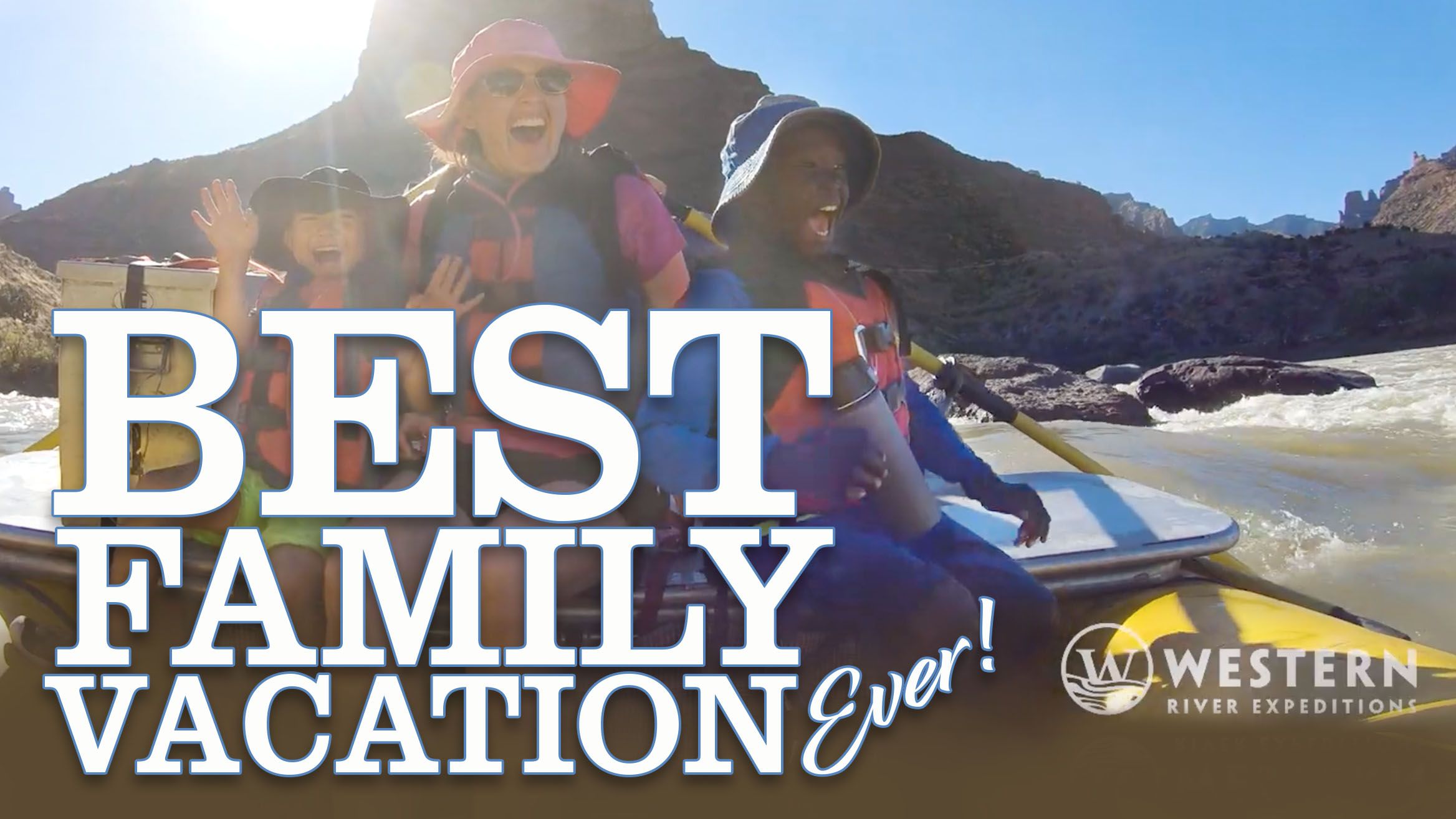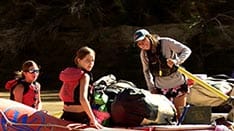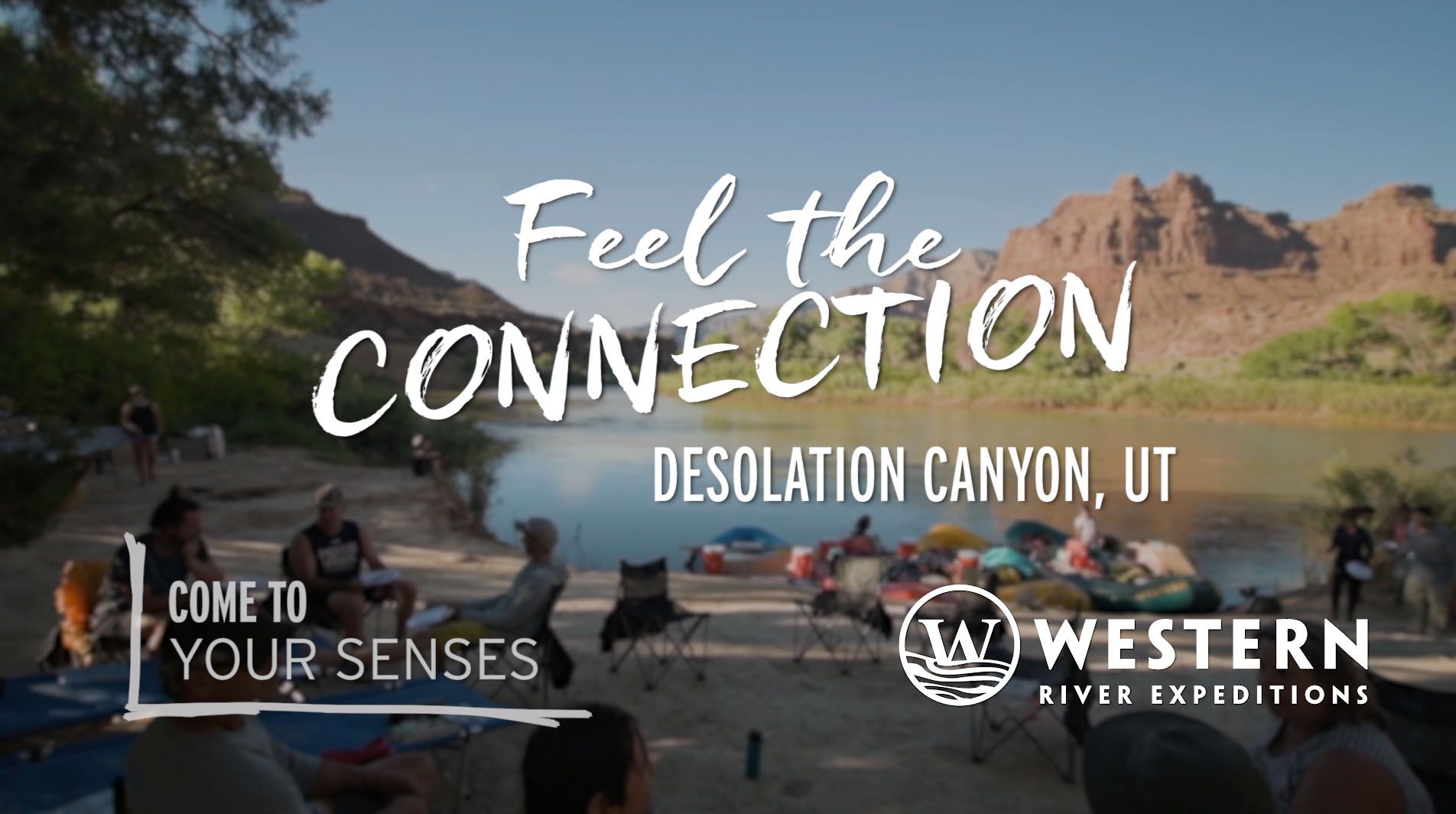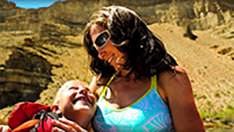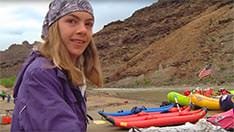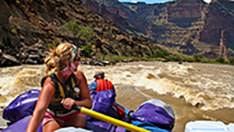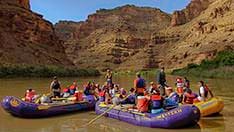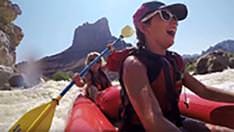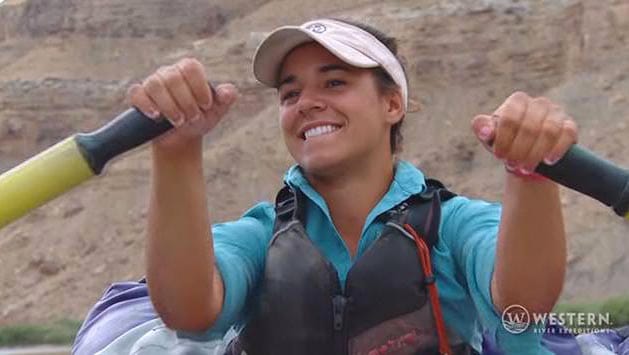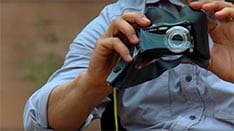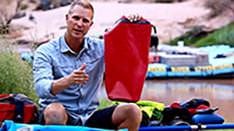Request your complimentary Expedition Guide
This comprehensive PDF guides include river maps, overview, full itineraries, camping and weather information, details on physical requirements, packing lists and more.

My name is Brandon Lake, I'm here with Western River Expeditions. We're going to talk about how to pack for your expedition. It is a very unique opportunity to come down here in the beauties of this incredible place and have a wonderful time, but it's always going to be a better vacation if you are prepared. Down here, things are a little unpredictable, and we are going to run through a couple of items that are going to make your experience on this expedition one that will be both unforgettable and more comfortable.
So let's go ahead and get started. First, I want to talk about the bags that you will have when you arrive and that will help you think through how these things are going to be packed. You should have received a packing list. Now this packing list comes from Western River Expeditions and contains everything that you need to pack for your adventure. On it you'll see the different types of bags that we mention, I'm going to run through those quickly.
The first one that is really important is that we pack our items in a soft sided duffle bag. This means no wheels, no hard bottom preferably. And the dimensions there are noted on your packing list, you can go ahead and take a look at that. A lot of these items that I'm going to show you today are actually sold through our retail partner, Red Rock Outfitters. You can visit redrockoutfitters.com and find this bag and all these items I'm going to go through. And we'll talk about those and that can be an easy place for shop or you could find a local retailer where you would find some of these things as well.
So you are going to take this duffle bag and you are actually going to put it inside of this dry bag. These dry bags are fairly decent size so you are going to be able to store that duffle bag inside of this. You'll end up rolling the top down to keep the water out and that is where your bag will go.
You are also going to have a smaller bag, which we call the day bag. And I'm going to talk specifically about some of the items that we want to put inside this day bag that will make your time during the day more comfortable. And similarly this rolls down, your guides will go how to do that and run through all of the that when you get here.
The first thing you are going to see on that packing list is the two-piece rain gear. Now you might question why, out here in the desert, do I need to bring rain gear? Well there are a couple of reasons. First of all, the water temperature is quite cold, it's about 52 degrees. In the mornings, you can see that the canyon walls really shoot up on both sides of us, what happens is it takes the sun a while. And when the sun is not hitting you directly it's quite cool in the morning. That water hitting our bodies can be a little bit chilly, so a lot of people like to put on their rain gear as a shield against that colder water.
The second reason is that the weather can be very unpredictable out here. When you are checking the weather forecast for your your expedition, a lot of times we are looking at a location that can be a 100 miles or more from where we are actually in the canyon. Rain storms out here in the desert can crop up anytime. Of course we hope that they don't but if they do it often offers a beautiful show of waterfalls and incredible scenery in the canyon.
So back to the rain gear, what we are talking about is an upper shell. We are recommending not just a poncho that you can throw over you, but a nice set of rain gear. You can see on Red Rock Outfitters what is featured on the gear and give you a good example of what to bring and look for. So we are talking about two piece, top and bottom. So that is first on the list.
The next thing you are going to see is your swimsuit. You could look at a couple of different things there. You could do a pair of boardshorts type swimsuits, those work just fine. A lot of our guests prefer to bring something like these, something with more pockets and maybe a zipper pocket on the side. They are kind of a cargo short that works very well. Now for woman, most woman find it most comfortable to bring a tankini top and bottom, not a full one piece suit because that makes changing and so forth in these conditions a little more difficult. But if you have a top and a bottom and a good pair of shorts it is a lot more comfortable when you're sitting on these rubber rafts with the water, sand, and the elements and so forth if we have our legs covered. So that covers the swimsuit portion of what we need to bring.
Next on the list you are going to see shirts. Now there are a couple of different options here when we talk about shirts. One popular option is the long sleeve UPF style shirts, they offer great sun protection, in addition they can get wet and keep us cool. Some people during the hotter months even prefer to bring a cotton shirt that will hold the water and keep us cool for even longer. But I think these quick drying shirts are a good solution because you can get in the canyon and you get these shirts wet and they will dry fairly quickly and sometimes that's desirable, if it has gotten a little cooler or it's in the morning you do want your shirt to dry off a little more quickly and so thats a nice thing. If you are hot you can always continue to get it wet, and that's good. But think about maybe bring a long-sleeve shirt, not only for cooler weather like we would normally thing but actually for sun protection. Another great shirt for the canyon is something like the one I'm wearing, this shirt can convert up because you can roll the sleeves and bottom them and it converts into a short sleeve. Or you can roll that back down for sun protection. That is a great. sort of, hybrid option there as well. Of course these come in short sleeve varieties as well and those can work nicely as well. So it's good to have a good couple of shirts that you can wear, don't plan on necessarily needing a different shirt for every day. Check your packing list for the quantity suggested and really follow that. Most of us tend to overpack, we think we are going somewhere where you need a different set of clothing, like we might think on a standard vacation. Really, out here we can wash those clothes and we can re-wear them very easily. You don't need to pack a lot.
The next thing on the list is some comfortable things for camp. You might want to bring a nice comfortable pair of shorts, when you get into camp it is nice to take a nice little bath in the river and change into a nice dry pair of shorts. Or you might like to bring along a pair of lightweight pants, they might also be nice for daytime. Nothing is better for sun protection that covering ourselves, so that is really important. Another thing that we might like to have in camp is a comfortable t-shirts. Those are nice for camp time and maybe for sleep as well. Think about what you might be comfortable sleeping in and pack accordingly.
The next thing on our list are socks. Now generally you won't be wearing your socks, unless you're a fan of wearing socks under your sandals like some are. But if we do get a foot injury or something like that socks can be a real nice protector against things getting into that. So we might want a paid and it's always good to have as a back up.
The next thing we see on the list is a lightweight fleece. Now i'm going to go over how to pack for the cooler weather trips as well. But it is a good idea on most trips throughout the summer to just have a real lightweight fleece. It may be something you wear on a cooler night, as things can cool down. You may wear it in the morning when you get up in the morning sometimes is a little cooler before you get on the water. Something nice about this, is if it does cool off, maybe after a rainstorm or something like that, you can keep this with you and layer it up over your shirt and underneath your rain gear and really warm yourself up underneath those layers.
Let's talk a minute about footwear. Footwear is a really important part of your trip, we recommend something like this with straps on it. You want a good sturdy sports sandal that you can really strap down to your foot. That should be a great option during the day, there are other options with closed toed version that some people like. Open toed version with the straps are a great solution as well. So find something that feels good on your foot. One side note about footwear, a lot of people will make this mistake, they will get their brand new footwear and come down on the river without wearing them before. That can be a real problem when you get down here when you are doing hikes and you are wearing them and you find that that sandal is rubbing you in places you didn't expect and you are going to get blisters and sore spots. So, make sure you get your footwear well in advance and wear it, break it in so that you can have a more comfortable experience down here. Personally, I also like to bring a real lightweight flipflop. Something that I can change into at camp and that is dry to wear around in the sand to keep additional foot protection on but not the sturdy sandal that you wear during the day. A lot of people like to bring something like that along as well.
The next thing on our list are hats. Now you have a couple different choices with hats, a standard baseball cap isn't a bad solution. A lot of guests, however, prefer something like this, wear you have a hat with a nice strap underneath it. The nice thing about that is you can cinch that up in the wind or tuck it away if it isn't windy. Some of these come in the variety that you can attach the sides to the top for a more stylish look. Something like that will be nice because it will keep the sun off of your ears and the back of your neck. It offers that wide brim and is even nice if we have a rainstorm or something like that to offer that additional protection, so that is a great option.
The next thing we see on the list is some of our personal items. And I'm going to go through some of these now. A lot of our guests will like to bring gloves, during the warmer months of the summer gloves like these would be nice. Now the reason we're recommending something like this is because if your hands aren't used to gripping the ropes that are maybe sandy and wet sometimes people come away with a little rub on those hands and be uncomfortable. So a lot of people will bring something like these to wear on the river.
One really critical element is our water bottle. Staying hydrated in the canyon is one of the most important things we can do and one of the more biggest issues we have in the canyon. So make sure you have an excellent water bottle and something to clip it on with. This can be really handy to just clip onto ropes. This is called a carabiner and we clip that onto our bottle and then clip it on to the rope on the boat and you keep near by and fill it up continuously throughout the day and drink to stay hydrated. Now there are some options for keeping this bottle a little cooler that have just come out so it's something to think about. You can find them in stores as well. You can actually store you bottle inside and it will keep your bottle a little cooler, actually quite cool, throughout the day. You can still clip that whole thing to the raft as well.
I also like to bring an additional carabiner for the day bag, so you can have your bottle somewhere and still clip your bag on. The bag is easy to clip with on with the snaps but bringing an addition carabiner can often be a nice thing to have down here on the river.
Another item you may want to bring down to the river is a river map. This is a great item to have here. You can keep it in your day bag, it is really nice for seeing where you are in the canyon. It also contains a lot of history and historical pictures that are fun to look at as well.
Let's go through some of our personal items as well. So our toiletry items, you want something small that holds all your items. This bag from Eagle Creek is a nice one. It folds into three pieces and has a nice mirror something to hang it on and a couple different compartments. Some things that you will want to think about in here are your toothbrush and toothpaste, these do not need to be large because you aren't down here for too long. So find a smaller travel sizes of deodorant, shaving items, floss, I put a pack of gum in there as well. Something that is really important and will help you in that you will be flying too is keep these things in some sort of plastic bag. That's nice because sometimes these bags will get inside a load and have pressure on them and so forth, and you don't want any tubes of different liquids and different stuff like that to explode. The heat is also a cause of this, so pack that stuff in a ziplock baggy and it will help you get through security in the airport and it is a good thing for the river as well.
I'm just going to mention a couple of things that are on the list that are really really important and often overlooked. One of those is lotion, when we're down here on the river we want a good quality lotion, so get to the store find something that will be really good for your skin and offer a lot of good moisturizing. You may even want to pack two or three tubes of this. It is amazing, especially if you're from an area that is a little more humid, you come here to the desert and you find your skin really drying out. Having something you can rehydrate that skin with is a really big deal and helps you stay more comfortable. Overpack on the lotion and you'll be happy you did.
Another recommendation I have on the shampoo and soap side is something the combines everything together. You don't need to pack big bottles of multiple things if you can by with something like this wonderwash, where you can just shampoo soap and everything. Nice and compact and again, small enough to go through security and so forth. A lot of times it is a good idea to not check your bag if you have a tight time frame close to your trip and you lost the bag or it got mixed up in transfer of airlines or whatever it may be there is a good chance that you would not be able to get that in time for your trip. So think about that as you are looking at your travel plans.
A couple of other personal items that are important are obviously sunscreen. This is an area where we want to find a very good quality sunscreen, at least 30 SPF and because you'll be applying this four or more times a day to keep that sun away. So make sure you have something good there.
Another thing that a lot of people will like are some sort of wipe. These adventure bath wipes are a great for the outdoors and offer a way to wipe off your feet, clean your face, and that sort of thing before you get into bed. They are really convenient that way and you can just keep that in your bag and throw them away a little later.
We also want to bring a towel, you have a couple of different options there. I really like these new microfiber towels because they are really small and dry quickly and a great option to bring down here on the river. In the store you can find this great towel here that has a map on it, kind of fun to look at when you are here and find where you are each night. It is a fun souvenir as well.
We also want to bring along a headlamp. A headlamp is great, opposed to a flashlight, as it allows you to put that on your head at night and still allows you have have your hands free to go through your bag or do whatever it is that you need to do. So those work out really well. One thing that people really like on these are some come with a red light on them. That is often very nice for reading and stuff like that because it doesn't attract any bugs or anything like that when you are using the red light. So that is something to think about.
On the list you will also see insect repellent. We recommend something small down here in the canyon. We don't see much of that, but just incase you get into an area where you see some it is good to have some. But it probably won't be too much of a problem down here.
We also want to make sure we have a good pair of sunglasses and it is nice to have some sort of retaining strap on those as well. It will keep them on your head because we're constantly moving around on the boat and swimming and so forth so you certainly don't want to loose your glasses. Find something good for a safety retainer on those.
Let's talk about a few final personal items here. One thing we certainly don't want to overlook on an expedition like this is any personal medication you may need. Whether that may be insulin, an inhaler, epinephrine or anything like that. Make sure you are prepared with that, we have cold storage available if you need it. Our guides, of course, down here on the river have excellent first aid kits and they are fully trained in first aid and administering all of that but it is certainly good for you to be personally prepared.
One thing I like to do it pack a ziploc bag with a few things in it. I like have a pack of tissue and I'll pack a few things that I think I may need personally during the trip. I like to pack ibuprofen just in case, a small ziploc bag is nice there. If you have a vitamin you can pack those. If you wear contacts make sure to bring an extra pair of those. We certainly don't hope to get sick, but just in case I bring some antidiarrheal, antihistamine and some cold medication. If you need asthma medication be sure to bring your inhaler. All those types of things that you know you might need on a personal level, prepare for that and you will be all the more comfortable down here on the river.
The last thing on our personal list is a garbage bag. It is nice to pack a small garbage bag or something like that if your clothes end up being wet when you are leaving camp or something like that and you don't want it to get your other things wet. You can certainly pack those items in the garbage bag and keep everything else dry inside your bag.
Now Western provides everything that you will need to sleep comfortably on the river. A comfortable cot, sleeping bag, and sheet. But you will want to bring a comfortable pillow with you. That can range from anything like a small pillow or we have this on here that is available in the store that is a great pillow. It looks like an airplane pillow but it quickly converts into a standard rectangular pillow as well. You can tuck the sides down into the body of the pillow to convert something that you can sleep on that looks more like a normal pillow.
That covers most of the things that we want to bring on a standard trip. Now I'm going to cover just a few more things that are highly recommended, especially in our early spring trips. Now, in early spring trips you can have wonderful temperatures that are absolutely comfortable during the day, but they can also be quite unpredictable. So we could run into a time in April or May maybe when things do get a little cooler and that also may happen in mid September but probably more likely in the earlier months. So a few things that we would recommend bringing there, and again this goes back to some of the layering. You certainly want to bring a beanie, now this isn't even a bad idea to bring on trips during the whole season because it can be a little cooler in the mornings and it can be a nice thing to sleep with or to put on in the morning. Also highly recommended, and essential for the cooler trips, is a set of long underwear. Both top and bottom, this allows you to really layer up and sleep more comfortably and wear in camp. It is a nice layering system as well.
We also recommend, where the water temperature is quite cool, is a neoprene sock that you can put underneath your sandals and wear on the river to prevent your feet from getting cold. And during those earlier months we also recommend, if you are going to do gloves, go to a full fingered glove that is a little bit thicker. That will help keep your hands warmer as well.
And the last thing that is recommended for these trips would be a couple of different options here. When we recommend a fleece or lightweight fleece for the rest of the year, on those trips you want to bring either a heavier weight fleece or even more recommended is a down filled jackets that you can really wear and warm up. You may even want to pair that with a thin shell. Some of that, we hope, will be over preparation for any cooler temperatures but you want to stay comfortable down here.
As you are packing at home, when things are calm and you can really think this through, what I recommend doing is that you take all the things that you think you are going to want inside of the day bag and you pack them separately inside a little grocery sack, or something like that. So you have your medications, your sunblock, your sunglasses, your rain gear, your lip balm and everything like that that you are going to need access during the day and put them in separate bags. Why that is nice is because when you get down to the river you are going to be presented with these two bags (shown in the beginning) and sometimes in the excitement of getting on the raft someone forgets something really important, especially if it is medication of something like that. Well if you take a moment to think about that in the calmness back home and you're prepared for that then you'll get here and simply grab that plastic bag out and put those things inside the day bag and keep the plastic bag maybe for a little garbage sack or whatever you might want to use it for that could be really useful.
Another common question we get is, "how do I dress on the first day of my river trip?". The answer is fairly simple, dress like you are ready to go rafting. What that means is you have your hat on, your sunglasses, you are wearing your sunscreen, you have a good shirt, you have your swimming suit on, you have your dirty river sandals on and you're basically ready to go.
Brandon Lake describes how to pack for your Desolation Canyon Expedition. This walk through the packing list will help you understand not only what you need on your trip, but why. You'll also be able to see each of the items first hand so you have a better idea of what to pack for yourself.
24:08
This comprehensive PDF guides include river maps, overview, full itineraries, camping and weather information, details on physical requirements, packing lists and more.

